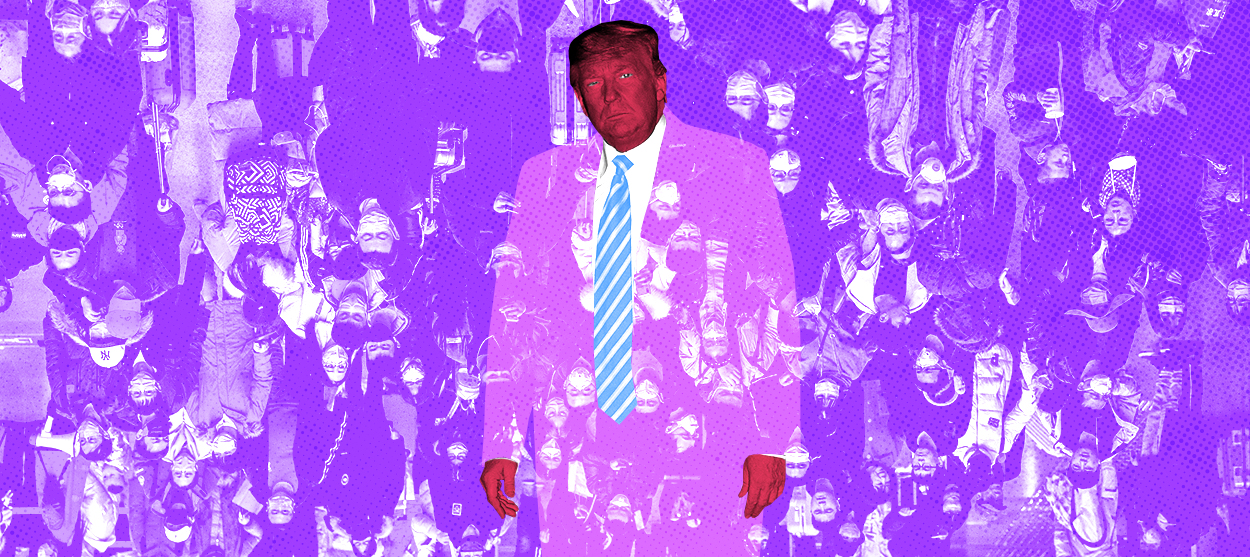A coronavirus recession would likely end Trump's presidency
Time to get worried, Republicans


A free daily email with the biggest news stories of the day – and the best features from TheWeek.com
You are now subscribed
Your newsletter sign-up was successful
The global coronavirus outbreak might accomplish something that myriad bad polls haven't: make Republicans fear losing the 2020 presidential election.
Until now, survey after survey has consistently shown President Trump losing to the Democrats in November. Like, to all of the Democrats. Yet Republicans have remained confident. They remember how the #FakePolls showed Trump losing to Hillary Clinton four years ago. More importantly, perhaps, GOPers have a deep faith that the strong economy will provide a powerful tailwind to Trump's re-election campaign.
But the plunging stock market, badly spooked by the unpredictable spread and impact of the virus, is suggesting the tailwind might turn into a headwind — and that could mean a one-term Trump presidency. Wall Street banks are already cutting their economic growth forecasts for the first half of the year. Beyond that, they're not so sure, an uncertainty reflected in wildly gyrating markets. Economic predictions about consumer demand and supply-chain disruptions are now also pandemic predictions. JPMorgan just trimmed its second-quarter projection for U.S. GDP growth by a quarter percent to 1.75 percent, but in a report to clients added that "extensive domestic 'community spreading' would prompt a larger downward revision."
The Week
Escape your echo chamber. Get the facts behind the news, plus analysis from multiple perspectives.

Sign up for The Week's Free Newsletters
From our morning news briefing to a weekly Good News Newsletter, get the best of The Week delivered directly to your inbox.
From our morning news briefing to a weekly Good News Newsletter, get the best of The Week delivered directly to your inbox.
Economic forecasts are always tricky business. Now, in addition to the usual mix of jobs numbers, consumer surveys, and corporate earnings reports, economists have to factor the spread of a virus whose transmissibility and lethality remains unclear. Economic consultancy Capital Economics concedes "there is no way our models can incorporate the risk of a widespread coronavirus outbreak in the U.S. which, just like it appears to have done in China, would almost inevitably cause a recession." As it is, Moody's Analytics predicts a 40 percent chance that the virus will grow into a global pandemic that would indeed push the United States and the rest of the global economy into a recession.
An election-year downturn is bad for any incumbent presidential party. There have been three presidential elections since 1960 where the election year saw a recession. The incumbent party lost all of them. One of political historian Allan Lichtman's famous "13 Keys to the White House" is that the U.S. economy is not in recession during the election campaign. But a downturn would be especially damaging for Trump, who has made a de facto bargain with voters: I may tweet lots of crazy stuff and engage in lots of dodgy behavior, but I won't screw up this long economic expansion. Hell, I may even do some things that help it, like tax cuts and deregulation. In a Washington Post-ABC News poll last month, 56 percent of respondents said they approved of the way Trump had approached economic issues. That mood would change dramatically with a recession even if voters don't directly blame Trump's handling of the virus outbreak for it, though they might. Trump's rambling press conference earlier this week was no confidence builder and may be playing a role in Wall Street's swoon.
Of course, the Trump White House remains bullish. On Monday, Trump tweeted, "Stock Market starting to look very good to me!" And that's been the consistent message coming from him and his advisers. Friday, National Economic Council Director Larry Kudlow told reporters, "Our threat assessment is low and the economy is fundamentally sound."
But here's what should really unnerve Republicans: Avoiding an outright recession may not be good enough to save the Trump presidency. Some election analysts blame Al Gore's loss to George W. Bush in 2000 to a mild economic slowdown during the year. Even though economic growth overall was a sizzling 4.1 percent — the fourth consecutive year of 4 percent real GDP growth or higher — growth slipped to just 0.5 percent in the third quarter and 2.5 percent in the fourth. As one analysis put it, "Our best guess, however, is that the slowdown was a major factor in Gore's defeat… the long economic boom that arrived just a little too late to get George Bush re-elected in 1992 seems to have ended just in time to elect his son."
A free daily email with the biggest news stories of the day – and the best features from TheWeek.com
The falling stock market might also be more than just a harbinger of slower economic growth. It could be a cause of that slower growth. In a 2014 paper, UCLA economist Roger Farmer suggested that the sharp fall in the stock market in the autumn of 2008 provides "a plausible causal explanation for the magnitude of the Great Recession." (Farmer thinks the Federal Reserve should be able to buy stocks to support the economy.) Barclays bank thinks there is a similar type of risk today, saying in a research note, "The rapidity of the deterioration in financial markets has elements of a viral pandemic induced panic that, if left unchecked, could spread to business and consumer confidence that could ultimately lead to reductions in spending and hiring." Moreover, with the value of financial assets at record levels versus the size of the economy, the health of Wall Street and Main Street are as closely linked to each other as they have ever been. And to the Trump presidency, as well.
Expect Trump to push the Fed to cut interest rates ASAP and maybe Congress to supply fiscal stimulus. Also expect more efforts by Team Trump to talk up the market.
Want more essential commentary and analysis like this delivered straight to your inbox? Sign up for The Week's "Today's best articles" newsletter here.
James Pethokoukis is the DeWitt Wallace Fellow at the American Enterprise Institute where he runs the AEIdeas blog. He has also written for The New York Times, National Review, Commentary, The Weekly Standard, and other places.
-
 Antonia Romeo and Whitehall’s women problem
Antonia Romeo and Whitehall’s women problemThe Explainer Before her appointment as cabinet secretary, commentators said hostile briefings and vetting concerns were evidence of ‘sexist, misogynistic culture’ in No. 10
-
 Local elections 2026: where are they and who is expected to win?
Local elections 2026: where are they and who is expected to win?The Explainer Labour is braced for heavy losses and U-turn on postponing some council elections hasn’t helped the party’s prospects
-
 6 of the world’s most accessible destinations
6 of the world’s most accessible destinationsThe Week Recommends Experience all of Berlin, Singapore and Sydney
-
 A Nipah virus outbreak in India has brought back Covid-era surveillance
A Nipah virus outbreak in India has brought back Covid-era surveillanceUnder the radar The disease can spread through animals and humans
-
 The stalled fight against HIV
The stalled fight against HIVThe Explainer Scientific advances offer hopes of a cure but ‘devastating’ foreign aid cuts leave countries battling Aids without funds
-
 Obesity drugs: Will Trump’s plan lower costs?
Obesity drugs: Will Trump’s plan lower costs?Feature Even $149 a month, the advertised price for a starting dose of a still-in-development GLP-1 pill on TrumpRx, will be too big a burden for the many Americans ‘struggling to afford groceries’
-
 Covid-19 mRNA vaccines could help fight cancer
Covid-19 mRNA vaccines could help fight cancerUnder the radar They boost the immune system
-
 Can TrumpRx really lower drug prices?
Can TrumpRx really lower drug prices?Today’s Big Question Pfizer’s deal with Trump sent drugmaker stocks higher
-
 The new Stratus Covid strain – and why it’s on the rise
The new Stratus Covid strain – and why it’s on the riseThe Explainer ‘No evidence’ new variant is more dangerous or that vaccines won’t work against it, say UK health experts
-
 Why are autism rates increasing?
Why are autism rates increasing?The Explainer Medical experts condemn Trump administration’s claim that paracetamol during pregnancy is linked to rising rates of neurodevelopmental disorder in US and UK
-
 RFK Jr. vaccine panel advises restricting MMRV shot
RFK Jr. vaccine panel advises restricting MMRV shotSpeed Read The committee voted to restrict access to a childhood vaccine against chickenpox
